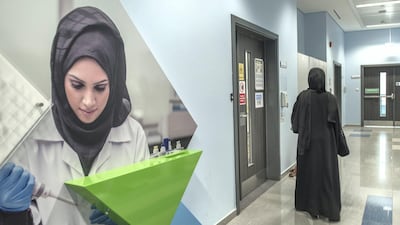Zayed and Ajman universities have entered the QS World University Rankings for top performing global institutions for the first time, bringing the number of UAE universities listed to eight.
QS World University Rankings is an independent evaluation of global university performance. Its latest tables rank the top 1,011 universities in the world. The criteria for ranking includes academic reputation, staff to student ratio, citations for faculty, employer reputation, number of international students and members of staff.
Zayed University was placed at 701-750 and Ajman University was ranked from 801-100. Khalifa University climbed 136 places to reach 315th in the world in the latest table, making it the top-rated institution in the country and fifth in the region.
UAE University comes in at 350, in sixth place in the region, while the American University of Sharjah is seventh in the region at its highest position yet, 376th.
________________
Read more:
Khalifa University ranked among Asia's best after merger of Abu Dhabi institutions
Abu Dhabi approves merger of universities and billions in projects
Khalifa University scores UAE's best ranking ever by Times Higher Education
________________
Dr Tod Laursen, president of Khalifa University, said its goal was to be “a top 200 institution within five years”.
Dr Laursen attributed the university’s jump up the rankings to the merger last year between Masdar Institute of Science and Technology, the Petroleum Institute and Khalifa University of Science, Technology and Research.
“Individually, we had faculties of 150 to 200 members at the most,” he said. “Now we have a combined faculty that’s just over 400.
“These rankings take account of the amount of papers that are published and where they’re published, and how much that work is cited. To have enough of a faculty doing enough work enables you to move up in the rankings.
“I expected the rankings to improve. We are all young universities. Our faculty is doing good work and it just needed the time to make its way into the literature.”
Khalifa University scores highly for its international faculty and student body.
“Because we are so new people still don’t know about us,” Dr Laursen said. “We still have some work to do on the marketing side to make ourselves more visible internationally. That’s where we have the most room for improvement in future.”
Dr Karim Seghir, chancellor of Ajman University, believes that the new partnerships the university has forged with institutions in Asia, the US, Latin America and Europe have helped to put Ajman on the global education map.
“We have been very active in organising international events in teaching, research and innovation. I have worked on the better positioning of the university, which was never a priority,” Dr Seghir said. “We have focused much more on innovation and started an incubator to help entrepreneurs.”
The university has been striving to attract global talent in students and faculty members, and had perfect scores for both criteria. “What helped us was the excellence in teaching, the calibre of the faculty members who we have hired in the last few years and that we are using interactive ways of teaching,” Dr Seghir said.
American University in Dubai improved its ranking to the 561-570 bracket this year. Last year it fell within the 601-650 slot. University of Sharjah also improved and is now in the top 651-700 universities. Abu Dhabi University has also improved and is now counted among the top 701-750 universities.
Input from more than 80,000 academics and 42,000 recruiters around the world contribute to the results of the QS World University Rankings.


